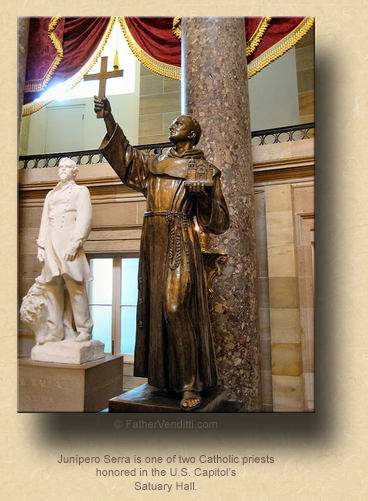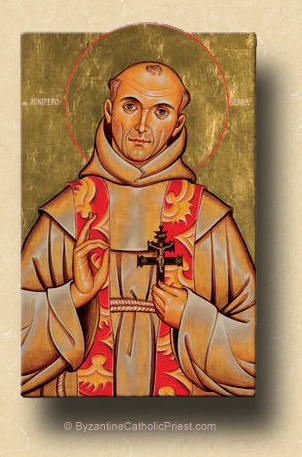Father Serra & the Case for Spiritual Maturity. Amos 3:1-8;4:11-12.
Psalm 5:4-8.
Matthew 8:23-27. The Memorial of Blessed Junípero Serra. The Thirteenth Tuesday of Ordinary Time. Readings from Cycle II of the feria, according to the Ordinary Form of the Roman Rite.
Return to ByzantineCatholicPriest.com. |
 9:08 AM 7/1/2014 — I went to high school just up the street from the U. S. Capitol; and, if you're not familiar with the city of Washington, particularly in the pre-nine/eleven days, there was no security around any of these government buildings; in fact, they were considered the property of the people, so you came and went as you pleased. Nothing was air-conditioned in those days, so you were always looking for a cool spot to sit and eat your lunch, since we were free to leave the school property; and, I used to take my lunch into the Capitol building and go down stairs into what we called the basement, what most people refer to today as Statuary Hall, because it was naturally cool, and I would eat my sandwich next to the statue of Father Serra. Now days you can only get in there by taking a tour. 9:08 AM 7/1/2014 — I went to high school just up the street from the U. S. Capitol; and, if you're not familiar with the city of Washington, particularly in the pre-nine/eleven days, there was no security around any of these government buildings; in fact, they were considered the property of the people, so you came and went as you pleased. Nothing was air-conditioned in those days, so you were always looking for a cool spot to sit and eat your lunch, since we were free to leave the school property; and, I used to take my lunch into the Capitol building and go down stairs into what we called the basement, what most people refer to today as Statuary Hall, because it was naturally cool, and I would eat my sandwich next to the statue of Father Serra. Now days you can only get in there by taking a tour.
Hold that thought for a moment as we consider today's Gospel lesson: “What sort of man is this, whom even the winds and the sea obey?” (Matt. 8:27). It begs a disturbing question: why are the disciples so amazed at our Lord's ability to command nature? This episode is from Chapter Eight of Matthew's Gospel, which is a pretty action-packed chapter. The chapter begins right off the bat with our Lord curing a leper, then he cures a centurion's servant of a palsy, then he stops by Peter's house and cures the Apostle's mother-in-law of a fever (it's hard to choose what's more remarkable there: our Lord curing his mother-in-law or the fact that Peter wants his mother-in-law cured), then he gets into the boat to cross over and performs this meteorological feat. And the chapter's not over yet: when he gets to the other side, he runs into two possessed men and casts their demons into the Gerasene swine; we're going to meet them tomorrow. So, the question is: on the heals of all of these impressive miracles and cures, why are they so amazed to see our Lord calming the sea? Not to make light of our Lord's miracles, but how many times does one have to see a card trick before you come to expect it?
I think the answer might be a defect of our fallen nature which is shared by all of us: we resist accepting the reality of things which don’t fit our predetermined view of the world. And this can be a real hindrance in our interior life; because, if there’s anything that makes a barrier to spiritual growth and union with God, it’s the inability to deal with the unexpected.
 I don’t think you could find a priest ordained for any length of time who will tell you that the priesthood is exactly what he thought it would be when he was in the seminary. And you can judge for yourselves how accurate was your prediction of what marriage would be like when you were engaged. Not to suggest that how it turned out is bad, but I think you’ll admit that it’s certainly different in many ways. But our ability to adjust our expectation is what enables us to persevere in these vocations—and not only persevere, but make them even more special than we had imagined. I don’t think you could find a priest ordained for any length of time who will tell you that the priesthood is exactly what he thought it would be when he was in the seminary. And you can judge for yourselves how accurate was your prediction of what marriage would be like when you were engaged. Not to suggest that how it turned out is bad, but I think you’ll admit that it’s certainly different in many ways. But our ability to adjust our expectation is what enables us to persevere in these vocations—and not only persevere, but make them even more special than we had imagined.
In the interior life, if our hearts are not open to accepting whatever the Lord chooses to throw our way, we run the risk of ending up bitter and frustrated, and in danger of losing our faith. As a priest I see this pattern repeated in people’s lives again and again: something will happen to change our life, and because it doesn’t fit our plan—because we view it as too much a burden—we just reject it as part of God's plan for us, as if we, ourselves, are the measure of all things. Maybe we tried but failed, and we don’t like to think of ourselves as failures, so we declare that what is being required of us is wrong because we, after all, are perfect. But who is the person who tries something once then quits. We usually call that person a loser.
When Father Serra was first ordained in Spain in the middle of the Eighteenth Century, he was such a brilliant student the Franciscans sent him to the University of Padua to teach philosophy and theology; he had no inclination that he would end his days on earth tramping the coast of California where he would establish nine missions and convert thousands to the Faith; but, it is an essential quality of almost all the saints that they were able to take the unexpected and run with it.
For those who choose to follow the Lord, regardless of their state in life, the road is always filled with potholes and detours. Our ability to deal with them and emerge from these trials calmly and with our heads still facing forward is a measure of our faith. Let us ask Blessed Junípero Serra to share with us the grace our Lord gave him: the grace to do whatever the Lord requires of us, no matter how surprising or unexpected it may seem.

|

